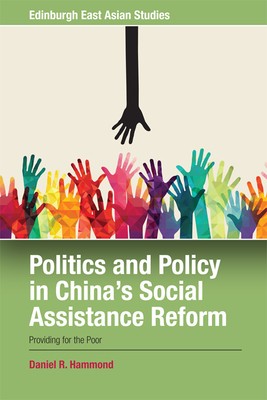
- We will send in 10–14 business days.
- Author: Daniel R Hammond
- Publisher: Edinburgh University Press
- ISBN-10: 1474420117
- ISBN-13: 9781474420112
- Format: 15.5 x 23.9 x 1.8 cm, hardcover
- Language: English
- SAVE -10% with code: EXTRA
Politics and Policy in China's Social Assistance Reform (e-book) (used book) | bookbook.eu
Reviews
Description
Addresses a significant gap in current coverage of Chinese social policy in the reform era, namely coverage of the dibao programme. Provides an introduction to Chinese social assistance since the 1990s which challenges the official narrative of a smooth policy process with intended outcomes. Uses extensive primary Chinese language sources to support the arguments being made using a grounded analytical approachincluding newspaper reports, government speeches and interviews Every day in the People's Republic of China 70 million people receive help from the state through the minimum livelihood guarantee (dibao). What began as a reform in the city of Shanghai in the early 1990s is now a key component in the measures used by the Communist Party of China to maintain social stability and legitimacy. While scholars regularly discuss how effective dibao has been in alleviating poverty very little addresses what influenced its development. This book argues that in order to understand dibao
we need to look at
EXTRA 10 % discount with code: EXTRA
The promotion ends in 18d.01:44:21
The discount code is valid when purchasing from 10 €. Discounts do not stack.
- Author: Daniel R Hammond
- Publisher: Edinburgh University Press
- ISBN-10: 1474420117
- ISBN-13: 9781474420112
- Format: 15.5 x 23.9 x 1.8 cm, hardcover
- Language: English English
Addresses a significant gap in current coverage of Chinese social policy in the reform era, namely coverage of the dibao programme. Provides an introduction to Chinese social assistance since the 1990s which challenges the official narrative of a smooth policy process with intended outcomes. Uses extensive primary Chinese language sources to support the arguments being made using a grounded analytical approachincluding newspaper reports, government speeches and interviews Every day in the People's Republic of China 70 million people receive help from the state through the minimum livelihood guarantee (dibao). What began as a reform in the city of Shanghai in the early 1990s is now a key component in the measures used by the Communist Party of China to maintain social stability and legitimacy. While scholars regularly discuss how effective dibao has been in alleviating poverty very little addresses what influenced its development. This book argues that in order to understand dibao
we need to look at


Reviews